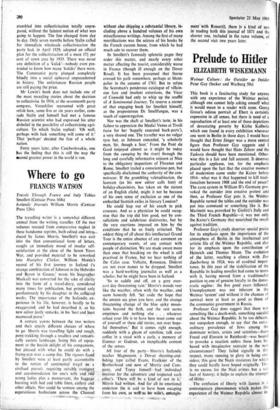Where to go
FRANCIS WATSON
Icelandic Journals William Morris (Centaur Press 126s) The travelling writer' is a somewhat different animal from the writing traveller. Of the two volumes rescued from comparative neglect in these handsome reprints, both edited and intro?,ri duced by James Morris, Smollett's was cast info the then conventional form of letters, caught an immediate mood of insulir self- satisfaction at the close of the Seven Years War, and provided material to be reworked into Humphry Clinker. William Morris's record of his first journey to Iceland ea strange combination of Johnson in the Hebrides and Byron in Greece,' wrote his biographer Mackail) was converted for the sake of clarity into the form of a travel-diary, considered many times for publication, but printed only posthumously by his daughter in the collected works. The importance of the Icelandic ex- perience in his life, however, is hardly to be exaggerated, and he had described it, as his new editor justly remarks, in his 'best and least mannered prose.'
A century yawns between the two writers and their utterly different choices of where to go. Morris was travelling light and rough, pony-trekking through a roadless and romanti- cally austere landscape, losing bits of equip- ment to the boyish delight of his companions, but pleased with what he could do with a frying-pan over a camp fire. The rigours facsa by Smollett were at least partly accountable to the notion of continental travel as a civilised pursuit, requiring suitable transport and accommodation for one's wife and two- young ladies plus a manservant, the baggage bursting with bed and table linen, cutlery and other effects. Nor could he venture among the superstitious barbarians across the Channel
without also shipping a substantial library, in- cluding above a hundred volumes of his own miscellaneous writings. Among the first of many mortifications was the seizure of his books by the French custom house, from which he had much ado to recover them.
In Smollett's famously splenetic pages they order this matter, and nearly every other matter affecting the tourist, considerably worse in France (though ill enough on the Dover Road). It has been presumed that Sterne crossed his path somewhere, perhaps at Mont- pelier in the autumn of 1763. But to refute the Scotsman's ponderous catalogue of villain- ous fare and insolent extortions, the Vicar
of Coxwold had only to whip up the soufflé of A Sentimental Journey. To reserve a corner
of that engaging book for Smollett himself, as the preposterous Dr Smellfungus, was a touch of supererogation.
Nor was the shaft at Smollett's taste, in his failure to appreciate the Medici Venus at Tivoli (save for her 'happily executed back-parts'), a very shrewd one. The traveller was no vulgar tyro but, as Johnson conceded, `a scholarly man, Sir, though a Scot.' From the Pont du
Gard (enjoyed almost as it might be today from the camping by the river) through the
long and carefully informative sojourn at Nice to the obligatory inspections of Florence and Rome, Smollett trailed a conscientious pen, but specifically disclaimed the authority of the con- noisseur. If the grumbling valetudinarian, the laureate (as his new editor calls him) of holiday-chauvinists, has taken on the stature of an English cliché, might it not be because of his own sense of exclusion as one of the embattled Scottish exiles in literary London?
He could leap out of his coach to pick crocuses. And as a physician he could recog- nise that the trip did him good, not by con- sultations and salubrious dis6overies, but by the very exertions imposed on him by the conditions that he so freely criticised. The oddest thing of all about this intellectual Grand Tour is the entire absence of any comment on contemporary events, of any contact with people of distinction. We are made aware more than once that breaking on the wheel is still practised in France, but we hear nothing of the Calas case. Voltaire, Rousseau, Diderot are not even names to be dropped. Smollett was a hard-working journalist as well as a scholar, but he might have been in Iceland.
'So to saddle and off, On a grey over- cast day threatening rain.' Morris's moods veer like the weather, often with the weather, and seem honestly felt. 'Set aside the hope that the unseen sea gives you here, and the strange threatening change of the blue spiky moun- tains beyond the firth, and the rest seems emptiness and nothing else . . . whatever solace your life is to have here must come out of yourself or these old stories, not over hope- ful themselves.' But it comes right enough, suddenly with a gleam of sunshine, talk over coffee in a stead with a carle, a memory of Gunnar or Gudrun, an inexplicable content of the senses.
All four of the party—Morris's Icelandic teacher Magnusson, a Dorset shooting-and- fishing type called Evans, Faulkner of the Brotherhood and now of Morris and Com- pany, and Topsy himself—had individual motives for the adventure and respected each other's. 'There will be a kind of rest in it,' Morris had written. And for all its emotional undertow (he is said to have been escaping from his own, as well+ as his wife's, entangle- ment with Rossetti), there is a kind of rest in reading both this journal of 1871 and the shorter one, included in the same volume, of the second visit two years later.






































 Previous page
Previous page